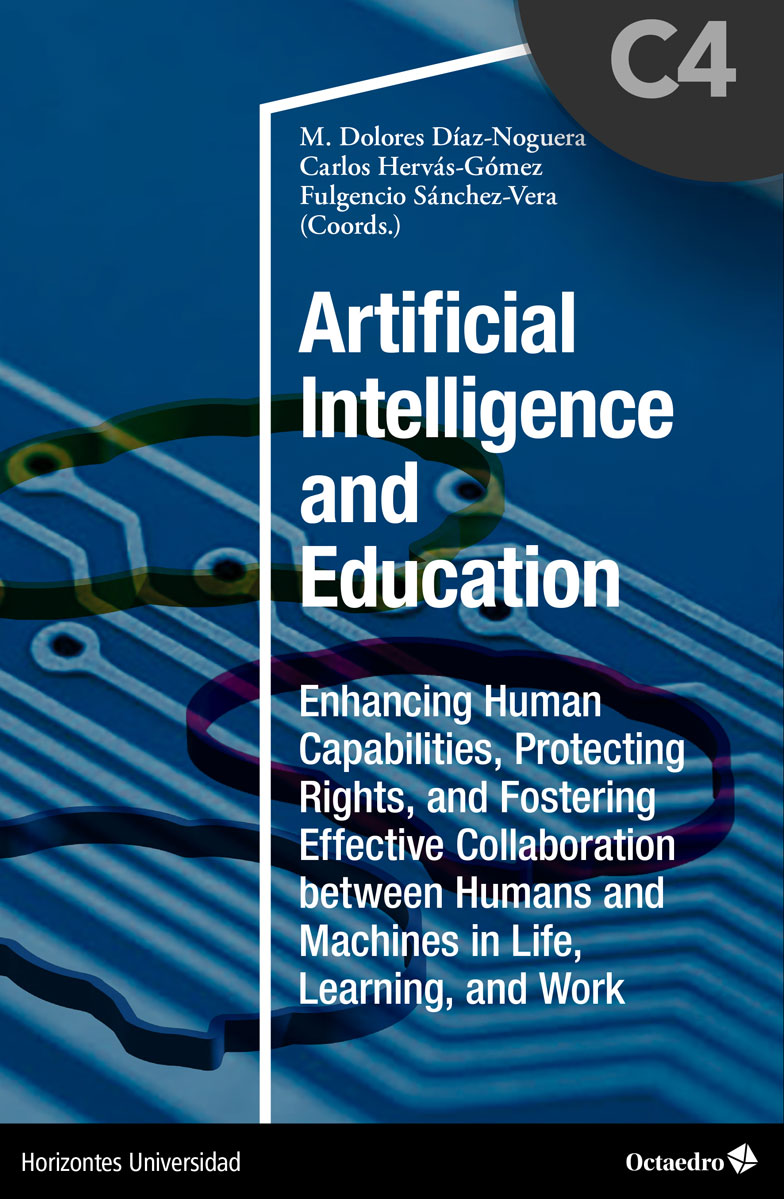FICHA TÉCNICA
Fecha de publicación:
06/11/2024
Doi del capítulo:
Título del libro: Artificial Intelligence and Education
URL del libro:
ISBN del libro: 9788410282452
DOI del libro:
Abstract
The use of Artificial Intelligence (AI) as a teaching tool to promote the development of critical thinking in primary education students, and its integration into the teaching-learning process, represents an important step in its use as a potentially transformative resource, allowing pedagogical challenges to be addressed through innovative and personalized approaches, focused on active learning and the different teaching strategies that can be implemented in the service of education. AI, understood as the ability of machines to simulate human cognitive processes, offers significant opportunities to enrich teaching-learning processes. By leveraging machine learning algorithms and data analytics, educators can design adaptive educational experiences that fit the individual needs of students, thereby encouraging their engagement and active participation in the learning process. Through the development of critical thinking, which is considered a fundamental skill that integrates the key competencies of the current educational system, students are encouraged to acquire the necessary skills to face the challenges of a society that needs people who are capable of handling large amounts of information. A pedagogical approach focused on students and a careful selection of active methodologies is necessary to ensure that the use of AI as a teaching tool encourages critical thinking and contributes significantly to the comprehensive development of students and the achievement of educational objectives in the digital age.
Palabras clave
Autores
PhD Gloria Morales-Pérez
Escuela Universitaria de Osuna, Spain
glorialuisamp@euosuna.org
PhD Pedro Román-Graván
Universidad de Sevilla, Spain
proman@us.es
https://orcid.org/0000-0002-1646-9247
María de los Ángeles Domínguez-González
Universidad de Sevilla, Spain
mariandg@us.es
https://orcid.org/0000-0002-9687-9325
Manuel Reina-Parrado
Universidad de Sevilla, Spain
mreinap@us.es
https://orcid.org/0000-0002-0801-0938
Cómo citar
Morales-Pérez, G., Román-Graván, P., Domínguez-González, M. Á., Reina-Parrado, M. (2024). Artificial Intelligence as a Teaching Tool to Promote the Development of Critical Thinking in Primary Education Students. In Díaz-Noguera, M. D., Hervás-Gómez, C., Sánchez-Vera, F. (Coords.), Artificial Intelligence and Education (pp. 65-78). Octaedro. https://doi.org/10.36006/09643-1-04
Referencias bibliográficas
«Águila, E. (2014). Habilidades y estrategias para el desarrollo del pensamiento crítico y creativo en alumnado de la Universidad de Sonora (doctoral thesis). Universidad de Extremadura, Spain.
Aparicio Gómez, W. O. (2023). La inteligencia artificial y su incidencia en la educación: transformando el aprendizaje para el siglo xxi. Revista Internacional de Pedagogía e Innovación Educativa, 3(2), 217-229. https://doi.org/10.51660/ripie.v3i2.133
Ayuso del Puerto, D., & Gutiérrez Esteban, P. (2022). La inteligencia artificial como recurso educativo durante la formación inicial del profesorado. RIED-Revista Iberoamericana de Educación a Distancia, 25(2), 347-362. https://doi.org/10.5944/ried.25.2.32332
Bautista-Castaño, I., González-Torre, P. L., & Hinojo-Lucena, F. J. (2019). A systematic review of research on the influence of artificial intelligence on higher education. Sustainability, 11(11), 3198.
Bezanilla, J., Fernández-Noriega, D., Poblete, M. y Galindo-Domínguez, H. (2019). Metodologías para el pensamiento crítico de enseñanza-aprendizaje en la educación superior: La opinión del maestro. https://doi.org/10.1016/j.tsc.2019.100584
Deroncele-Acosta, A., Nagamine-Miyashiro, M., & Medina-Coronado, D. (2020). Desarrollo del pensamiento crítico. Revista Maestro y Sociedad, 17(3), 532-546.
Díaz, L., & Montenegro, M. (2010). Las prácticas profesionales y el desarrollo del pensamiento crítico. XXXII Simposio de Profesores de Práctica Profesional, Universidad Nacional de Rosario, Argentina. http://www.economicas.uba.ar/wpcontent/uploads/2016/05/ CECONTA_SIMPOSIOS_T_2010_06_Diaz_Montenegro.pdf
Dillenbourg, P., & Jermann, P. (2007). Designing integrative scripts. In F. Fischer, I. Kollar, H. Mandl, & J. M. Haake (Eds.). Scripting Computer-Supported Collaborative learNing: Cognitive, computational, and educational perspectives (pp. 275-301). Springer.
Gautreaux, M., & Ross, W. (2018). Pensando de manera crítica sobre el pensamiento crítico. Aula Abierta, 47(4), 383-386.
Hervás-Gómez, C., Díaz-Noguera, M. D., Román-Graván, P., & Domínguez-González, M. Á. (2023). Educación inclusiva en la era de la inteligencia artificial: análisis de PROMPT para la atención a la diversidad. In C. Hervás-Gómez, P. Román Graván, J. García Jiménez, & C. Argüello Gutiérrez (Eds.). Conexiones digitales: las tecnologías como puentes de aprendizaje (pp. 529-549). Universidad de Sevilla.
Liu, D. Y., & Wang, Y. (2020). Application of Artificial Intelligence technology in the teaching of thinking skills in higher education. Education and Modernization, 1(1), 29-33.
López, G. (2012). Pensamiento crítico en el aula. Docencia e Investigación, 22, 41-60. Recuperado de https://bit.ly/30chE8K
Nieto, A. M., & Saiz, C. (2011). Skills and dispositions of critical thinking: are they sufficient? Anales de Psicología, 27(1), 202-209.
Palau, N. C. R. (2023). Inteligencias artificiales en la formación del pensamiento crítico en Ciencias Sociales. Maestro y Sociedad, 20(4), 1023-1029.
Parra, E., & Lago de Vergara, D. (2003). Didáctica para el desarrollo del pensamiento crítico en estudiantes universitarios. Educación Médica Superior, 17(2) https://bit.ly/3fsabch
Peña, V. R. G., Marcillo, A. B. M., & Ramírez, J. A. Á. (2020). La inteligencia artificial en la educación. Dominio de las Ciencias, 6(3), 28.
Terrones Rodríguez, A. L. (2021). Inteligencia artificial responsable: humanismo tecnológico y ciencia cívica. Trillas.
Vergel Ortega, M., Rincón Leal, O. L., & Paz Montes, L. S. (2019, November). Mobile devices for the development of critical thinking in the learning of differential equations. Journal of Physics: Conference Series, 1408(1), 1-6).
Pérez-Ortiz, M., Gómez-Pulido, J. A., & Rojas, I. (2018). Analysis of Artificial Intelligence techniques in education. Applied Sciences, 8(10), 1885.»
